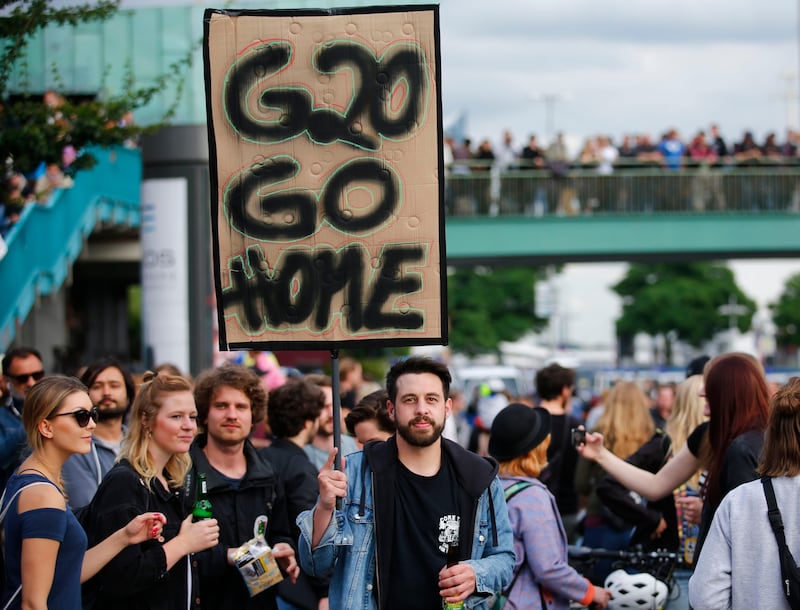HAMBURG // The international fight against terrorism, the related, thorny issue of Qatar and growing division between Europe and the United States will feature prominently as world leaders gather in the German city of Hamburg for a potentially stormy summit starting on Friday.
The prospects of a tense meeting of G20 - which brings together 19 industrialised and emerging nations plus the 28-member European Union – rose on Wednesday when the German chancellor Angela Merkel again asserted that Europe could no longer fully rely on the US under Donald Trump’s presidency.
Mr Trump will be among heads of government attending Friday’s opening session of the two-day event. He has already clashed with Mrs Merkel and the new French president, Emmanuel Macron, over immigration and climate policy respectively.
A huge security operation has been mounted by German authorities to protect the summit from anti-capitalist protesters.
Officials have said as many as 8,000 demonstrators, including many intent on violence, are likely to converge on the city for the two-day summit. Protest organisers, who include extreme left-wing groups as well as those wanting peaceful opposition, say the numbers will be much greater.
The presence of Mr Trump, a hate figure to the European left, centre and environmental campaigners, has heightened fears of rioting in Germany’s second city, which is also Mrs Merkel’s birthplace.
Mrs Merkel added to pre-summit controversy as she welcomed the Chinese president Xi Jinping to Berlin on Wednesday, saying their meeting ahead of the Hamburg gathering was "a good opportunity to expand and broaden our extensive strategic relations".
She told him China and Germany could “make a contribution” to calming current turmoil tin the world.
Amid European dismay over the new White House administration’s “"America First" approach to trade, immigration and the environment, Mrs Merkel said in a clear reference to the US in May that “the times in which we can fully count on others are somewhat over”.
In an interview which appeared on Wednesday in the weekly newspaper Die Zeit, which is published in Hamburg, she said she still felt the same. "It is, for example, open whether we can and should in the future rely on the US investing so much as it has so far in the United Nations' work, in Middle East policy, in European security policy or in peace missions in Africa," she said.
While she conceded that Europe had no right to insist on the US committing itself around the world, she questioned to extent to which it would interest itself at all in key areas. “"The US will probably not engage in Africa to the extent that would be necessary, particularly since they barely have oil interests any more in Africa and the Arab world," she said.
Mrs Merkel, who chairs the summit as head of the host nation’s government, said differences could not be “swept under the carpet”.
Citing opposite visions on free trade, she said that while Europe sought “chances to cooperate for everyone's benefit, globalisation is seen in the American administration as a process which isn't about win-win situations, but about winners and losers".
On Qatar, Germany has said it and the EU stand ready to help in arbitrating the dispute between the gas-rich emirate and three of its neighbours - Saudi Araba, the UAE, Bahrain – plus Egypt, which accuse Doha of supporting, financing and harbouring terrorist organisations.
Qatar denies the claims but is open about its backing for the Muslim Brotherhood and, to a lesser extent, Hamas.
With the summit agenda already including the need to combat the flow of funds to ISIL and other terror groups, it seems inevitable that the dispute with Qatar will figure at least in fringe discussions.
The American delegation may come under pressure to clarify what strikes some observers as contradiction between Mr Trump’s pro-Saudi sentiments and his state department’s friendlier approach towards Qatar.
- Additional reporting by Associated Press







